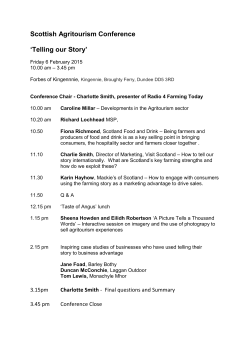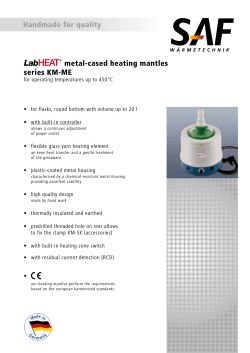
Challenging Climate Change with Minority Ethnic
Challenging Climate Change with Minority Ethnic Communities WSREC West of Scotland Regional Equality Council www.cookgrowsew.co.uk What is a carbon footprint? Challenging Climate Change with Minority Ethnic Communities Introduction To Energy Efficiency Energy costs are an important part of every household. With energy bills rising each year, it has become even more essential to know how to decrease the usage of fuel which will not only help you save money but also reduce your carbon footprint. This information pack will explain, in an easy way how to make your home more energy efficient and how to save money on energy bills. You will also find information about the support and advice available to you to make your home greener. FACT: According to the UK Government, energy used in homes is responsible for more than a quarter of Scotland’s carbon dioxide emissions. And 80% of home energy is used for heating. Carbon footprint is the measurement of the impact you have on the planet. Energy we use, producing and transporting food, clothes and other items all lead to emission of greenhouse gases like carbon dioxide into the atmosphere. Greenhouse gases trap the sun’s heat and keep the earth warm. Too much CO2 in the air leads to the change in our climate, also known as global warming. Why Save Energy? A large part of the energy we use comes from burning coal, oil and gas. Although you might not use these fuels at home yourself, it is quite likely that at least some of the power you use at home comes from burning these sources of energy. The energy we use at home is a significant part of Scotland’s annual CO2 emissions. FACT: Saving energy can help you reduce your carbon footprint and tackle climate change – it will also reduce your fuel bills. Our contribution to climate change: Simple methods to reduce your carbon footprint and save money. FACT: The World Health Organisation’s standard for warmth says 18°C is suitable for healthy people who are appropriately dressed. Get the Temperature Right •Try to heat only the rooms you are using in your home. Most radiator temperatures can be regulated individually. •Turn down your thermostat by just 1°C – each degree will save you around £35-£50 a year and almost a third of a tonne of carbon. •Keeping the heating on at a lower temperature for a longer period will be cheaper than short bursts of heating. •Energy will be wasted if windows are opened at the same time as the heating is on. •If you are going on holiday or will be away during winter periods then you can turn the thermostat right down to 13°C without risking frozen pipes or other problems. Making Your Radiators More Efficient •Bleed your radiators on a regular basis. Get your heating system checked at least once a year. •Your radiators can work more efficiently if you place silver foil behind them. This means that they will radiate heat back into the room, rather than heat-up the brickwork. •You can fit a shallow (5cm) shelf above radiators to direct heat into the room •If painting your radiators then use radiator paint. FACT: Investing in a thick duvet could save 10% on your total annual heating bill by lowering the heating by five degrees on winter nights. Other Ways to Keep Warm: Keep Any Draughts Out •You can use draught excluders for doors and letterboxes. •Keep the doors closed and turn down the radiators in the hall to make sure that you use energy to heat up only the rooms you actually use. •Thicker curtains will help to keep the heat inside of the house especially in the winter. Close them at night. Open your curtains in the mornings to let the sun warm your home for free. Saving Energy In The Kitchen Light •Replace your home with energy saving light bulbs. •Turn off any lights in the rooms that you are not using. If you are using energy saving light bulbs turn off the light if you are going to be out of the room for longer than 5-10 minutes. FACT: Energy saving light bulbs initially may seem more expensive to buy, but they last up to 12 times longer and use 80 % less electricity than traditional light bulbs. Over a single energy saving bulb’s lifetime you could save £35 in electricity and replacement costs. Hints and Tips •Cooking larger portions 2-3 times a week will save more energy than cooking every day. Remember to refrigerate or freeze any left overs. •Try to match the size of the pan with the size of a hob, use the biggest hob only for big pots to reduce the energy cost. •Cut food into smaller portions so it will cook faster, also you can defrost most frozen foods before placing them in the oven to cook. •Avoid opening the oven door if unnecessary, heat loss will require the oven to heat up again and waste energy. •Boil only the water you need when making tea or coffee. It could save you £20 on your annual energy bill. FACT: If you are using an old fridge then we highly recommend you upgrade to a more efficient modern model. Advances in the past 15-20 years have reduced the energy use of refrigeration by over 100%. Dishes •If you hand wash your dishes try to wash them all together at the end of an evening. You will also save water this way. •Dishwashers will typically use less water than hand washing if you are washing a full load of dishes. Always fully load your dishwasher, it will use the same amount of energy and water even if you are washing less items. Air dry the dishes to help conserve energy. Washing Clothes •It is highly recommended to wash clothes in 30°C water, as heating water will increase the cost substantially. Put a full load of clothes into the washing machine because it will use the same amount of water and energy even if it is half full. •Air dry the clothes instead of using a tumble dryer to save energy. Turn It Off: Help Available Do not leave appliances on standby but switch them off from the main source. TVs, mobile phone chargers, digital radios, microwaves etc are still consuming energy on stand-by. There are a number of schemes and grants available that can help you to cover the costs of making improvements to your home. Whether you would like to make your home more energy efficient through insulating it, changing to a more efficient boiler, double glazing or installing solar panels you may be eligible for financial support. FACT: 10-15% of the average household electricity bill is due to the power used by machines during standby. By turning off the appliances you could save £35 a year on your energy bills. The combined effect of appliances such as radios or computers being left on stand-by is 4,000,000 tonnes of carbon dioxide emissions in the UK each year. These emissions are the result of fossil fuels being burnt at power stations to produce the electricity to power appliances that are not even used. Hot water: •If your home has a hot-water tank or cylinder, it should have at least 8cm (3 inches) of insulation. This will reduce the cost of heating the water and keep it hot for longer. •If there is no thermostat on the hot-water tank it is worth looking into having one fitted. The hot water thermostat should be set at 63°C as this is usually hot enough for most household use. Free Home Energy Advice Visits A number of organisations provide FREE home energy visits to assess how energy efficient your home is and suggest simple and practical changes that you can make to assist you further. A Home Energy Advice Visit could save you money and reduce the amount of energy you use in your home. You can contact our Cook Grow Sew Project at any time to book your FREE appointment. Full information is available on the last page of this leaflet. Free Advice and Information G.HEAT Free help to householders in Glasgow to reduce their fuel bills and to help them make more effective use of money they spend on fuel. Tel: 0800 092 9002 (freephone number) Email: g-heat@thewisegroup.co.uk Website: http://www.g-heat.org.uk Greener Scotland A great source of information about greener living including advice about how to save energy, reduce waste, travel smarter and eat greener. Website: http://www.greenerscotland.org/ Other ways to reduce Carbon Emissions •Look for alternative ways to travel to work and other places such as local transport, cycling, walking or car sharing. •Recycle old clothes, toys and furniture. If it’s still in good condition then pass it on to a charity shop so that your pre-loved goods can be appreciated by others. •Where possible, try to source food which is locally produced. •Food can travel many miles to get here causing an increase in carbon emissions. Challenging Climate Change with Minority Ethnic Communities Cook Grow Sew Project Our Project can help you book your home energy visit and give you information about workshops and classes that can show you other ways in which you can reduce your carbon footprint, save money and live a healthier lifestyle. For more information contact our team: Project Coordinator: Timothy Mwakasekele Email: tmwakasekele@wsrec.co.uk Community Activities Officer: Ola Pawluk Email: apawluk@wsrec.co.uk Tel: 0141 337 6626 West of Scotland Regional Equality Council West of Scotland Regional Equality Council (WSREC) is a charitable organisation which works to eliminate discrimination, promote good community relations and to create an equality of opportunity for all residents of the West of Scotland. The ‘Cook, Grow and Sew’ Project is funded through Keep Scotland Beautiful Climate Challenge Fund. Please contact us for more information on WSREC projects and services: West of Scotland Regional Equality Council Napiershall Street Centre 39 Napiershall Street Glasgow G20 6EZ Tel: 0141 337 6626 Fax: 0141 339 2647 Email: admin@wsrec.co.uk Website: www.wsrec.co.uk and www.cookgrowsew.co.uk www.facebook.com/wsrec123 WSREC West of Scotland Regional Equality Council
© Copyright 2025















